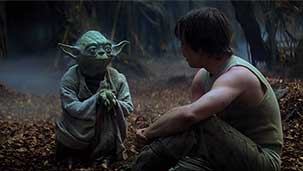I’ve wanted to write some version of this letter for a long time.
This is probably not the most original insight, but I’ve long maintained that the stature of the entire Star Wars saga is due mainly to the halo effect caused by The Empire Strikes Back. I’m not casting aspersions on all of the other films – Star Wars, specifically, is of course its own, different kind of masterpiece – but, let’s be honest: ever since Empire, the Star Wars movies have been a study in diminishing returns. And that downward trend coincides with one obvious event: the end of your involvement as producer.
As you know, much of the producer’s job is to say no. Whether it’s budget, schedule, or the worst tendencies of a filmmaker, a good producer keeps a holistic view of a project and reigns in anything that threatens the original vision. If necessity is the mother of invention, then it could be argued that a producer’s duty is to sometimes force necessity—to create boundaries that force creative decisions.
But I’m not writing this letter to bitch about what happened after George Lucas surrounded himself with spineless yes-men. I’m writing to praise The Empire Strikes Back, a film I can comfortably say is nearly perfect.
Empire is that rare occurrence that results from every decision being right. So let’s talk a few of them out.
First of all, this film moves. It benefits from the heavy (if seemingly effortless) lifting that Star Wars did in establishing the universe. With the world-building and character introductions out of the way, Empire hits the ground running at a full sprint and never lets up. As a precursor of things to come, about a minute after we catch up with Luke, he gets his face smashed in and is dragged off to a cave (of course, this was also a necessary event, to explain the scars Mark Hamill received from a car accident between films). The intended message comes through loud and clear: no one is safe. We’re in darker territory than Star Wars.
This is made even more clear by the decision to reverse the plot structure of Star Wars, placing the big, show-stopping battle in the first act instead of the third. This establishes the fact that Empire is essentially an extended chase sequence, with not a lot of time to slow down for long expository exchanges. Thank god.
The go-for-broke narrative works its way into the performances as well. Leigh Brackett and Lawrence Kasdan amp up the exchanges, particularly between Han Solo and Princess Leia, giving them a classic Hollywood screwball comedy zing (not surprising, considering Brackett’s bona fides). Re-watching Harrison Ford and Carrie Fisher exchange insults, I could imagine director Irvin Kershner using His Girl Friday as a reference point for his actors: talk as fast as you can, and force the audience to try and keep up. There’s no hand-holding here—we don’t need it anymore (strangely, this approach was jettisoned for Return of the Jedi, whose first 30 minutes is nothing but a series of character reintroductions.)
Speaking of Kershner, I’m not sure how involved you were in selecting him as director, Gary, but it was a very smart move. Empire is the most well-directed of all six Star Wars films—by a country mile. But it’s not his visual flair that wins the day (even though Empire is also the best-looking film of the series), it’s his focus on the basics: performance and character. As an outsider to this cinematic universe, Kershner was able to hone-in on what he knew how to do best, which was to push out all the superfluous crap that traditionally clogs up storytelling (c.f. The Phantom Menace).
This kind of laser-sharp attention is what makes Yoda work as the heart and soul of the film. Empire has its share of action centerpieces (the extended lightsaber duel between Luke and Vader has never been topped in emotional intensity) and mind-blowing plot twists (yes, that one), but Yoda is what gives the film its depth. I can only guess at your reaction when you saw that the emotional heft of your production was going to rest on the performance of a 3-foot tall muppet, but whatever reluctance (or sheer terror) you may have felt was for naught. And your faith in Kershner was rewarded, as he treated Yoda the only way he knew how: as an actual character. This might sound obvious, but Yoda’s subsequent appearances have proven that the presence of muppeteer Frank Oz is not enough to make him work onscreen. Again, it comes down to decisions – character and performance – and they were perfect.
I could go on – the ingenious cliffhanger with Han Solo, edited to look like a possible last-minute rescue; the way you showed just enough of Darth Vader to prove there’s a human inside the armour – but I’m going to leave you with a simple thanks.
Thank you for helping assemble – and then trusting – the production team to make their own decisions. Thank you for having the faith in the audience’s ability to keep up. But most importantly, thank you for having the backbone to keep George Lucas disciplined. Because no one has since, and that’s why The Empire Strikes Back is the only perfect Star Wars film.
Thanks,
Casey








